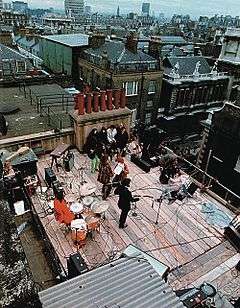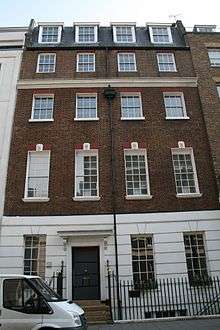The Beatles' rooftop concert
 Aerial view | |
| Date | 30 January 1969 |
|---|---|
| Venue |
Apple Corps Ltd 3 Savile Row, London, UK |
| Coordinates | 51°30′37.48″N 0°8′23.13″W / 51.5104111°N 0.1397583°W |
| Participants |
John Lennon Paul McCartney George Harrison Ringo Starr Billy Preston |
| Length | 42 minutes[1] |
| Producer | George Martin |
| Engineers |
Glyn Johns Alan Parsons |
The Beatles' rooftop concert was the final public performance of the English rock band the Beatles. On 30 January 1969, the band, with keyboardist Billy Preston, surprised a central London office and fashion district with an impromptu concert from the roof of the headquarters of the band's multimedia corporation Apple Corps at 3 Savile Row. In a 42-minute set, the Beatles were heard playing nine takes of five songs before the Metropolitan Police Service asked them to reduce the volume. Footage from the performance was later used in the 1970 documentary film Let It Be.
History
Although the concert was unannounced, the Beatles had planned on performing live during their Get Back sessions earlier in January.[2] It is uncertain who had the idea for a rooftop concert, but the suggestion was conceived just days before the actual event.[3] George Harrison brought in keyboardist Billy Preston as an additional musician, in the hope that a talented outside observer would encourage the band to be tight and focused.[3] Ringo Starr remembered:
"There was a plan to play live somewhere. We were wondering where we could go—'Oh, the Palladium or the Sahara'. But we would have had to take all the stuff, so we decided, 'Let's get up on the roof'".[4]
The audio was recorded onto two eight-track recorders in the basement of Apple[5] by engineer Alan Parsons,[6] and film director Michael Lindsay-Hogg[7] brought in a camera crew to capture several angles of the performance—including reactions from people on the street.[6]
When the Beatles first started playing, there was some confusion from spectators watching five stories below, many of whom were on their lunch break. As the news of the event spread, crowds of onlookers began to congregate in the streets and on the roofs of local buildings. While most responded positively to the concert, the Metropolitan Police Service grew concerned about noise and traffic issues.[8] Apple employees initially refused to let police inside, ultimately reconsidering when threatened with arrest.[8]
As police ascended to the roof, the Beatles realised that the concert would eventually be shut down, but continued to play for several more minutes.[9] Paul McCartney improvised the lyrics of his song "Get Back" to reflect the situation, "You've been playing on the roofs again, and you know your Momma doesn't like it, she's gonna have you arrested!"[10] The concert came to an end with the conclusion of "Get Back", with John Lennon saying, "I'd like to say thank you on behalf of the group and ourselves and I hope we've passed the audition".[11]
Set list
The set list of this last public performance by the Beatles is as follows.[1][12]
- Get Back—sound check, jam
- Get Back—"rehearsal"
- Get Back; I Want You*; Don't Let Me Down—jam
- Get Back
- Don't Let Me Down
- I've Got a Feeling; Ooh! My Soul—tease (Richard Penniman)
- One After 909—jam
- One After 909
- Danny Boy—tease (Ernestine Schumann-Heink)
- Dig a Pony—tuning up, jam
- Dig a Pony—false start; Dig a Pony
- God Save the Queen —impromptu few bars jam (Thomas Arne)
- I've Got a Feeling; Rainy Day Women #12 & 35—single line "Everybody must get stoned" sung twice by Lennon (Bob Dylan)
- A Pretty Girl Is Like a Melody—tease (Irving Berlin)
- Get Back—false start
- Don't Let Me Down
- Get Back
*This song's title became I Want You (She's So Heavy) in August 1969.
New Beatles tracks played in their entirety
The rooftop concert consisted mainly of nine takes of five Beatles songs, including:
- "Get Back" (three takes)
- "Don't Let Me Down" (two takes)
- "I've Got a Feeling" (two takes)
- "One After 909" (one take)
- "Dig a Pony" (one take)
The first performance of "I've Got a Feeling", and the recordings of "One After 909", and "Dig a Pony" were later used for the album Let It Be.[13] In 1996, a "rooftop" version of "Get Back", which was the last song of the Beatles' final live performance, was included in Anthology 3.[14] An edit of the two takes of "Don't Let Me Down" was included on Let It Be... Naked.[15]
Legacy

The Beatles' rooftop concert marked the end of an era for many fans. They did record one more album, Abbey Road, but by September 1969 the Beatles had unofficially disbanded.[16] Several of the rooftop performances, particularly that of "Dig a Pony", showed the Beatles once again in top form, if only temporarily.[17] Fans believed the rooftop concert might have been a try-out for a return to live performances and touring.[18]
The Rutles' "Get Up and Go" sequence in the film All You Need Is Cash mimics the footage of the rooftop concert, and uses similar camera angles.[19] In January 2009, tribute band the Bootleg Beatles attempted to stage a 40th anniversary concert in the same location, but were refused permission by Westminster City Council due to licensing problems.[20]
In The Simpsons fifth season episode "Homer's Barbershop Quartet", the Be Sharps (Homer, Apu, Barney and Principal Skinner) perform a rendition of one of their previous hits on a rooftop. George Harrison, who guest-starred in the episode, is shown saying dismissively "It's been done!" As the song ends and the credits begin, Homer repeats John Lennon's phrase about passing the audition.[21]
In the 2007 film Across The Universe, a musical made up entirely of Beatles' music, Sadie's band performs a rooftop concert in New York City which mimics the original. It is interrupted and closed down by the New York Police Department.[22]
U2 also referenced the concert in their video for "Where the Streets Have No Name", which featured a similar rooftop concert in Los Angeles.
McCartney played a surprise mini-concert in midtown Manhattan on 15 July 2009 from the top of the marquee of the Ed Sullivan Theater, where he was recording a performance for Late Show with David Letterman. News of the event spread via Twitter and word of mouth, and nearby street corners were closed off to accommodate fans for the set, which duplicated the original Beatles gig.
Personnel
- John Lennon – lead/backing vocals, lead guitar, rhythm guitar
- Paul McCartney – lead/backing vocals, bass guitar
- George Harrison – backing vocals, lead guitar, rhythm guitar
- Ringo Starr – drums
- Billy Preston – electric piano
Citations
- 1 2 "20 Things You Need To Know About The Beatles' Rooftop Concert". mojo4music.com. 30 January 2014. Retrieved 31 January 2016.
- ↑ Lewisohn 1992, pp. 306–307.
- 1 2 Lewisohn 1992, p. 307.
- ↑ The Beatles 2000, p. 321.
- ↑ Ryan, Kevin; Kehew, Brian (2006). Recording the Beatles: the studio equipment and techniques used to create their classic albums. Curvebender. p. 518. ISBN 978-0-9785200-0-7.
- 1 2 Perone 2005, p. 5.
- ↑ Everett 1999, p. 216.
- 1 2 "Beatles rooftop birthday:It's 40 years since the fab four's last ever concert". BBC. 30 January 2008. Retrieved 12 December 2013.
- ↑ Perone 2005, pp. 5–6.
- ↑ Lifton, Dave. "44 YEARS AGO: THE BEATLES PERFORM LIVE FOR THE LAST TIME, ON A LONDON ROOFTOP". Ultimate Classic Rock. Retrieved 12 December 2013.
- ↑ Everett 1999, p. 222.
- ↑ "The Beatles Setlist at Apple Corps Rooftop, London, England January 30 1969". Setlist. Retrieved 31 January 2016.
- ↑ Everett 1999, p. 219.
- ↑ MacDonald 2005, p. 334.
- ↑ Beatles Bible
- ↑ "Paul McCartney: 'I Want to Live in Peace'". Life Magazine. 7 November 1969.
- ↑ MacDonald 2005, p. 331.
- ↑ Perone 2005, p. 6.
- ↑ "Ladies and Gentlemen : The Rutles!". CD Review. 12 (1–9): 80.
- ↑ Banerjee, Subhajit (30 January 2009). "The Beatles rooftop concert: It was 40 years ago today". The Telegraph. Retrieved 12 December 2013.
- ↑ Suebsaeng, Asawin (30 January 2012). "8 Videos to Commemorate the Beatles' Final Concert, 43 Years Later". Mother Jones. Retrieved 30 January 2014.
- ↑ Ebert, Roger (2009). Roger Ebert's Movie Yearbook 2010. Andrews McMeel Publishing. p. 1. ISBN 978-0-7407-9218-2.
Sources
- The Beatles (2000). The Beatles Anthology (1st ed.). Chronicle Books. ISBN 978-0-8118-3636-4.
- Everett, Walter (1999). The Beatles as Musicians: Revolver through the Anthology. Oxford University Press. ISBN 978-0-19-512941-0.
- MacDonald, Ian (2005). Revolution in the Head: The Beatles' Records and the Sixties (3rd (2007) ed.). Chicago Review Press. ISBN 978-1-55652-733-3.
- Lewisohn, Mark (1992). The Complete Beatles Chronicle:The Definitive Day-By-Day Guide To the Beatles' Entire Career (2010 ed.). Chicago Review Press. ISBN 978-1-56976-534-0.
- Perone, James E (2005). Woodstock: An Encyclopedia of the Music and Art Fair – American history through music. Greenwood Publishing Group. ISBN 978-0-313-33057-5.